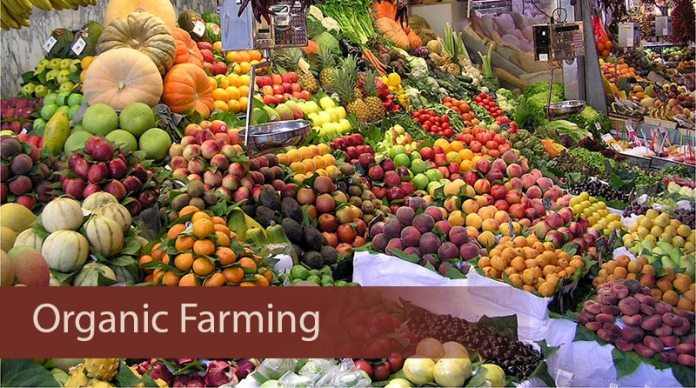What is Organic Farming?
Organic farming focuses on locally grown products and large scale use of local products and local wisdom. It excludes the need and demand for external fertilizers for crop production and management. Organic Farming also is known as “Organic Agriculture”.

The organic farming mainly relies upon:
- Crop rotations
- Use of crop residues
- Animal manures
- Legumes
- Green manures
- Off farm organic wastes
- Bio fertilizers
- Mechanical Cultivation
- Mineral bearing rocks
- Control of insect, weeds and other pests.
Advantages of Organic Farming
- It helps to maintain environment health by reducing the level of pollution.
- It reduces human and animal health hazards by reducing the level of residues in the product.
- It helps in keeping agricultural production at a sustainable level.
- It reduces the cost of agricultural production and also improves the soil health.
- It ensures optimum utilization of natural resources for short-term benefit and helps in conserving them for future generation.
- It not only saves energy for both animal and machine, but also reduces risk of crop failure.
- It improves the soil physical properties such as granulation, good tilth, good aeration, easy root penetration and improves water-holding capacity and reduces erosion.
- It improves the soil’s chemical properties such as supply and retention of soil nutrients, reduces nutrient loss into water bodies and environment and promotes favourable chemical reactions.
Components of Organic Farming
- Household wastes
- Kitchen wastes
- Animal wastes
- Farm wastes
- Biofertilizers
- Azotobacter
- Rhizobium
- Azospirillum
- Rhizobacteria
- Mycorrhizal Fungi
- Blue-Green Algae
- Azolla
Objectives of Organic Farming
- Increase genetic diversity.
- Promote more usage of natural pesticides.
- Ensure the right soil cultivation at the right time.
- Keep and build good soil structure and fertility.
- Control pests, diseases and weeds
Techniques involved in Organic Farming
-
Crop Rotation:
It is the technique to grow various kinds of crops in the same area, according to the different seasons, in a sequential manner.
-
Green Manure
It refers to the dying plants that are uprooted and turned into the soil to make them act as a nutrient for the soil to increase its quality.
-
Biological Pest Control
With this method, we use living organisms to control pests with or without the use of chemicals.
-
Compost
Highly rich in nutrients, it is a recycled organic matter used as a fertilizer in the agricultural farms.
-
Management of Soil
Soil management is the soul of organic farming. It’s a well-known fact that after taking one crop, the soil of the farm loses most of its nutrients and its fertility goes down. To process of recharging the soil with all the necessary nutrients is called soil management.
In organic farming, the nutrients are recharged in the soil through natural ways to increase soil fertility. For this purpose, animal waste is increasingly used to recharge the soil with the necessary nutrients. The bacteria present in the animal waste make soil fertile once again.
Importance of organic farming
The local traditional knowledge is extensively used in the fields for ensuring better productivity and more profit to the local farmers. Organic farming also helps in strengthening the people’s belief in them, encouraging them to use their knowledge to improve the productivity of their fields.
One such concept was the introduction of sustainable agriculture, which means an integrated approach to increasing farm yield and managing resources in an efficient way that future generations should not bear its consequences. The practice of organic farming ensures the productivity and sustainability of the field and field crops. The process ensures the use of organic wastes like crop, animal and farm wastes and other biological components to make the farming more environment-friendly.
How Successful Organic Farming can be done
In organic production, farmers choose not to use some of the convenient chemical tools available to other farmers. Special attention is being given for choosing crop rotation and tillage practices to avoid or reduce crop problems.
Cereal and forage crops can be grown organically relatively easily to due to relatively low pest pressures and nutrient requirements. Corn is being grown more frequently on organic farms but careful management of weed control and fertility is needed. Meeting nitrogen requirements is particularly challenging.
Fruit and vegetable crops present greater challenges depending on the crop. The yield reduction varies by crop and farm.
Livestock products can also be produced organically. Animals must be fed only organic feeds Feed must not contain mammalian, avian or fish by-products. All genetically engineered organisms and substances are prohibited. Antibiotics, growth hormones and insecticides are generally prohibited. If an animal becomes ill and antibiotics are necessary for recovery, they should be administered. The animal must then be segregated from the organic livestock herd and cannot be sold for organic meat products. Vaccinations are permitted when diseases cannot be controlled by other means.
Organic Farming in India
Organic Farming Association of India is a dedicated Indian organisation working specially for promoting and developing the concept of Organic farming in India. It works by organizing various conferences, conventions and events to promote organic farming. While the association has formulated programmes to assist organic farmers with organic certification and also participates fully in the Participatory Guarantee System (PGS) of organic certification designed mostly for small and marginal farmers, it has steadfastly resisted becoming an agency for the procurement and distribution of organic produce. It prefers instead to promote and support individuals, communities, NGOs and networks that are in the business of organic marketing. The organization aims to help organize farm-households and families engaged in organic farming and connected activities into a recognizable entity that will effectively represent their interests at local, state, regional and national levels.
The OFAI has recently organised an ‘Organic Mahotsav’ from 29th November 2019 – 01st December 2019 at Shilpgram, Udaipur. It was 7th in the series of the popular biennial conventions held by the organization. The convention provided a platform for organic farmers from all over India to share, learn and grow. Renowned scientists, policymakers, seed savers, innovators had come together to bring the developments in organic farming to a common platform.

She is a Conservation Biologist deeply concerned with the protection and sustainability of natural resources and wildlife. She is particularly interested in studying and addressing the loss of Biodiversity and educating the people about the same. She has a Master’s degree in Zoology with Post Graduate Diploma in Environment and Sustainable Development and another in Sustainability Sciences.
